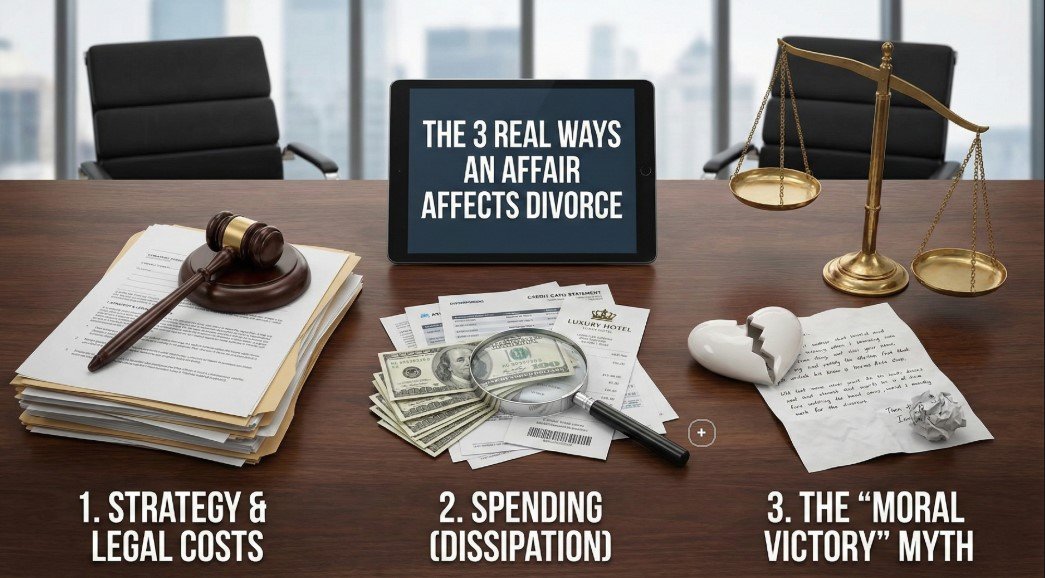By Katie VandenBerg, CDC Certified Divorce Coach® | Focused Forward
Quick Answer: Roommate Syndrome occurs when a marriage shifts from an intimate partnership to a logistical arrangement. While often dismissed as “normal,” this emotional disconnect creates dangerous financial blind spots and often leads to one partner emotionally exiting the marriage years before the legal filing. Recovery requires either intentional reconnection or a strategic, dignified exit plan. It is not just an emotional phase; it is a decision point.
One of the most common yet shame-filled reasons for seeking a divorce is the sense of simply “living as roommates” rather than as a married couple. Clients often hesitate to share this with me because they fear it’s not a “real” reason for divorce.
But the reality is, many couples reach a stage where they experience nothing—no passion, no meaningful conversations, no intimacy, and not even arguments. It’s just a persistent, empty silence that grows over time.
As a CDC Certified Divorce Coach®, I see couples sit in this silence for years—sometimes a decade—before they realize they are not just disconnected. They have been emotionally divorced for longer than they’ve been legally married.
What Is Roommate Syndrome? (And Why It’s Dangerous)
Roommate Syndrome is what happens when a marriage shifts from being emotionally intimate to logistically functional.
- You’re co-managing a household.
- You’re coordinating schedules.
- You’re splitting bills.
- But you are not connecting.
The conversations are transactional: Did you pay the electric bill? Can you take the car in tomorrow? What time is soccer practice?
It feels safe because it’s predictable. There is no conflict—because conflict requires caring enough to fight. But this “safety” is dangerous. It erodes the relationship slowly. You don’t wake up one day as strangers; it happens in tiny increments.
My Work as a Divorce Coach
 | When I speak with clients in divorce coaching sessions, they often describe how one partner eventually suggests marriage counseling. Yet, this often results in outright refusal or a few lukewarm attempts that lead nowhere. The couple quickly falls back into the familiar rhythms of “nothingness.” The once-dissatisfied partner now feels trapped in a long waiting game, perhaps deciding to stay until the kids are grown. They’ve mastered the art of putting on a positive front in public, but behind closed doors, they barely interact. |
The Human Side: A “Roommate Syndrome” Case Study
To understand how subtle this is, let’s look at “Lisa and Mark” (names changed for privacy).
They had been married for almost twenty years. They had built a comfortable home, raised two children, and had all the trappings of success. But behind closed doors, Lisa felt an ever-growing emptiness.
At first, Lisa shrugged it off as a phase. “We’re just busy,” she told herself. She tried initiating date nights. She asked for more quality time. Mark’s responses were polite but indifferent. They would occasionally put in a half-hearted effort, only to slide right back into the “nothingness.”
Lisa planned to wait until the kids graduated. She felt guilty for wanting to leave a “good man” who wasn’t abusive or unfaithful. It wasn’t until she started working with me that she realized she wasn’t selfish for wanting connection—she was simply honest about the fact that the marriage had expired.
Coach’s Insight: Lisa’s story is common. One partner often emotionally exits the marriage long before the divorce is filed. This creates an asymmetry that makes the legal process harder because one person is ready to move on while the other is blindsided.
Who’s Fault is the Divorce?
 | When the topic of divorce finally arises, the partner who feels secure in the relationship dynamic may be shocked, blaming their spouse for “ruining” things. Yet in divorce coaching, we explore how this is a natural cycle that many couples endure, and it’s never the fault of just one person. Each individual in the relationship plays a role, and recognizing this can be a powerful first step in moving forward. |
The Strategic Danger: Financial Blind Spots
While the emotional toll is heavy, the financial toll of Roommate Syndrome is often worse.
Divorce is a Business Transaction. I remind every client: The court does not divide hurt feelings; they divide assets. When couples live as roommates for years, they often develop “financial blind spots.” One person handles the money while the other stays willfully ignorant to keep the peace.
By the time they reach my office, we often discover:
- Hidden debt or maxed-out credit cards.
- Retirement accounts that were never funded.
- One spouse has been financially planning their exit for years.
The longer you live disconnected, the more risks you accumulate. Establishing financial boundaries isn’t just for divorce; it’s critical for protecting your future.
Roommate Syndrome in a Small Town
If you are navigating this in Central Illinois, the stakes feel higher. In a small town, your marriage is public, and your separation will be too.
Reputation Management is Survival In small towns, everyone knows everyone. You shop at the same grocery store; you see your in-laws at church. When a “perfect” couple divorces, people talk.
The Strategy: You cannot control the gossip, but you can control your dignity. Never trash-talk your ex in public. Maintain a neutral script. In small communities, how you handle the split defines your reputation for years to come.
The Trap: Because Roommate Syndrome looks “fine” from the outside, announcing a divorce can shock your community.
Why We Stay: The Sunk Cost Fallacy
Why do we stay in “roommate” marriages for so long? Usually, it’s the Sunk Cost Fallacy.
The logic: “I’ve already invested 18 years. If I leave now, it’s all wasted.” The truth: Time already spent is gone. You cannot get it back by spending more time being unhappy.
Staying in a stagnant marriage doesn’t protect your investment; it prevents you from building the life you actually want.
Related Reading:The Sunk Cost Fallacy in Divorce: Why Years Invested Shouldn’t Keep You Stuck
Practical Toolkit: Moving From “Roommates” to Resolution
If you realized you are in this cycle, you need a plan. Here are the tools I give my clients to navigate this transition with dignity.
1. The BIFF Method for Communication If you are separating, stop having emotional arguments. Switch to the BIFF method for all texts and emails:
- Brief: Keep it short.
- Informative: Facts only.
- Friendly: Neutral tone.
- Firm: Clear boundaries.
- Use this especially if your “roommate” dynamic has turned high-conflict.
2. Build Your Board of Directors. You cannot do this alone. You need a team with clear roles:
- Attorney: For the law.
- Therapist: For the grief and emotional processing.
- Certified Divorce Coach: For the strategy, organization, and decision-making.
3. Parallel Parenting If you have kids, you may need to shift from “co-parenting” (which requires friendship) to “parallel parenting” (which requires business-like efficiency). The goal isn’t to be friends; it’s to be functional.
💡 Pro Tip: Stability is not the same as health. A marriage can be stable and still be suffocating. Don’t confuse the absence of chaos with the presence of connection.
But How Do You Really Know If Divorce Is the Next Step?
 | I often remind my clients that if counseling has been attempted, if heartfelt conversations have led nowhere, then waiting only delays the inevitable. Staying in a stagnant marriage can lead to deeper financial entanglements and make it more difficult to achieve the fresh start they crave. Divorce coaching provides a structured, supportive way to address the fears, grief, and logistical challenges of moving on.In my role as a divorce coach, my goal is to help individuals make peace with their decisions and plan for a future that reflects their values and goals. Many people stay far too long, thinking things will improve over time. But I always emphasize in divorce coaching that our time is valuable. The longer we remain in a state of “nothingness,” the more we risk losing the opportunity for a fulfilling future. |
So What Do You Do?
 | Whether you’re just beginning to question the marriage or are ready to move forward, connecting with a divorce coach can provide the guidance, insight, and reassurance needed to take the next steps with confidence. You are not alone in feeling this way, and by acknowledging your needs, you’re already moving closer to a future filled with potential. |
Frequently Asked Questions
What causes Roommate Syndrome?
It is primarily caused by neglect and prioritization drift. When couples prioritize children, careers, and chores over connection for years, intimacy fades. Unresolved conflict also creates a wall of silence.
Can a marriage recover from Roommate Syndrome?
Yes, but only if both people want to do the work. It requires honest communication and professional help. If one person has already emotionally exited, recovery is unlikely.
Is “falling out of love” a valid reason for divorce?
Absolutely. You do not need abuse or infidelity to justify leaving. A marriage that lacks connection, intimacy, and partnership is not functioning.
Do I need a divorce coach if my divorce is amicable?
Yes. Even amicable divorces involve complex financial and logistical decisions. A coach helps you get organized and ensures you don’t give away your future just to “be nice.
Key Takeaways
- Roommate Syndrome is an invisible runway to divorce. It happens when emotional intimacy is replaced by logistical functionality.
- One partner often exits early. The emotional divorce usually happens years before the legal filing, creating painful asymmetry.
- Divorce is a business transaction. Financial blind spots accumulated during the “roommate” years can be costly. A strategy is required to protect your assets.
- Reputation matters in small towns. How you handle the public aspect of your separation is just as important as the legal aspect.
- The Sunk Cost Fallacy keeps people stuck. Don’t spend the rest of your life paying for the last 18 years. Focus forward.
Conclusion
Roommate Syndrome doesn’t fix itself. It doesn’t get better with time. It gets worse.
But if you are willing to be honest about where you are—and strategic about where you want to go—you can navigate this with dignity. Maybe your marriage can be saved. Maybe it can’t. Either way, you deserve to stop living in limbo.
You don’t have to navigate this alone. If Roommate Syndrome has brought you to a crossroads, my Smart Start 90-Day Program will help you get organized, grounded, and Focused Forward.
Let’s build your strategy. Let’s protect your future.
Katie VandenBerg is a CDC Certified Divorce Coach® and founder of Focused Forward, based in Central Illinois. She specializes in helping high-functioning professionals navigate the emotional and strategic complexities of divorce.






